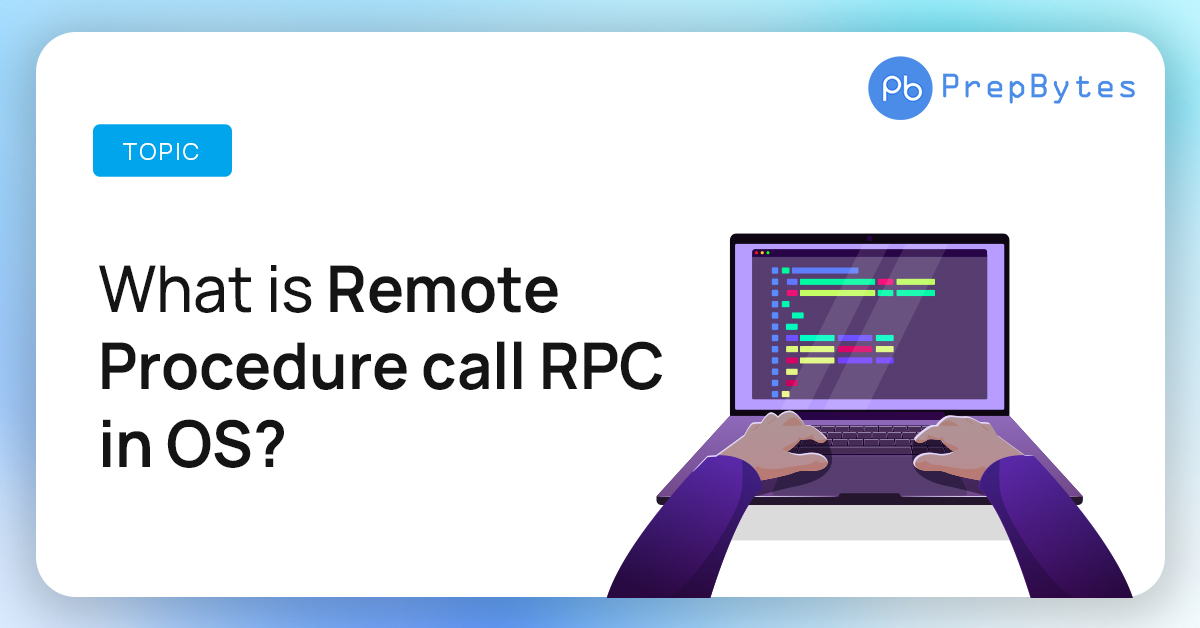Last Updated on August 28, 2023 by Mayank Dham

Remote Procedure Call (RPC) is a powerful abstraction used in operating systems and distributed systems to facilitate communication between processes running on different machines. It enables developers to write distributed applications by allowing them to call functions or procedures on remote systems as if they were local. This article delves into the concept of Remote Procedure Call, its working principles, advantages, challenges, and its significance in modern computing.
What is Remote Procedure Call (RPC)?
Remote Procedure Call is a mechanism that allows a program to execute code in another address space (usually on another machine) as if it were a local procedure call. It abstracts the complexities of inter-process communication, enabling developers to create distributed applications without having to manage low-level networking details.
How RPC Works?
Below is the working of RPC in OS:
- Client-Server Interaction: In an RPC scenario, a client process initiates a procedure call to a remote server process. The client specifies the procedure to be executed and its arguments.
- Marshalling: The client’s arguments are marshalled (serialized) into a format suitable for transmission over the network. This ensures that data is converted into a standard representation that both the client and server understand.
- Transmission: The marshalled data is sent over the network to the server machine. This involves network protocols such as TCP/IP or UDP.
- Unmarshalling: On the server side, the received data is unmarshalled (deserialized) to reconstruct the original function call and its arguments.
- Procedure Execution: The server executes the requested procedure using the provided arguments. The result is calculated and marshalled back to the client.
- Transmission and Unmarshalling: The result is transmitted back to the client, where it is unmarshalled to retrieve the output of the remote procedure call.
Advantages of RPC in Operating System
Here are some Advantages of RPC in OS:
- Abstraction: RPC hides the complexities of network communication, allowing developers to focus on application logic rather than network protocols.
- Modularity: Developers can design applications as a collection of distributed components, making the system easier to manage and update.
- Code Reusability: Reusable procedures can be called remotely from multiple locations, reducing redundancy and improving maintainability.
- Performance: RPC can optimize performance by efficiently handling data serialization, network communication, and procedure invocation.
- Scalability: RPC enables the creation of distributed applications that can scale horizontally by adding more servers to handle increased load.
Challenges and Considerations of RPC in OS
Challenges of RPC in OS are:
- Network Latency: Network delays can impact RPC performance, causing increased response times.
- Reliability: Network failures or server crashes can lead to the loss of RPC requests or responses.
- Security: Ensuring secure communication and data integrity between client and server is crucial.
- Data Marshalling: Proper serialization and deserialization mechanisms are required for correct data transmission.
- Compatibility: Ensuring compatibility between client and server versions can be challenging when updating or maintaining the system.
RPC in Modern Computing:
RPC remains a cornerstone in distributed systems and microservices architectures. Technologies like gRPC, CORBA, and Java RMI (Remote Method Invocation) build on the RPC concept, providing robust frameworks for building scalable and efficient distributed applications.
Conclusion
Remote Procedure Call (RPC) is a fundamental concept in operating systems and distributed computing, allowing processes to communicate seamlessly across network boundaries. It simplifies the development of distributed applications by abstracting away networking complexities and providing a familiar procedure call interface. While RPC offers numerous advantages, it also poses challenges related to performance, reliability, security, and compatibility. In today’s interconnected computing landscape, RPC continues to play a crucial role in enabling efficient and scalable communication between distributed components.
FAQs related to Remote Procedure Call in OS
1. How does RPC differ from local procedure calls?
In local procedure calls, the procedure is executed within the same address space as the caller. With RPC, the procedure is executed on a remote machine, and data is exchanged over the network.
2. What is the purpose of marshalling and unmarshalling in RPC?
Marshalling is the process of converting data and function arguments into a format suitable for transmission over the network. Unmarshalling is the reverse process, where the transmitted data is reconstructed into meaningful arguments.
3. What are some benefits of using RPC in distributed systems?
RPC abstracts the complexities of network communication, promotes code reusability, modularizes applications, and allows for scalable and efficient communication between distributed components.
4. How does RPC handle data types that are not directly transmittable over the network?
RPC frameworks often provide serialization and deserialization mechanisms to convert complex data structures into a format that can be transmitted over the network.
5. Is RPC limited to client-server communication?
No, while the client-server model is common, RPC can also be used in other communication paradigms like peer-to-peer interactions or even in message-passing systems.


